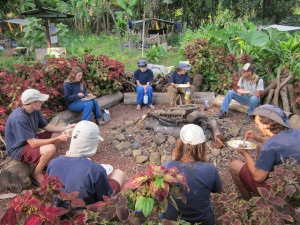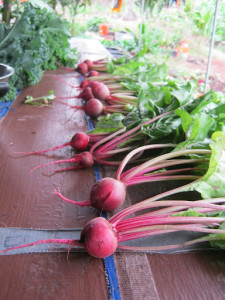By Travis Slagle, Horticultural Therapy Director
The following article was published in ‘Circles on the Mountain’ Rites of Passage in a Rapidly Changing World, Issue #17, 2013. This is an annual publication of the Wilderness Guides Council.
Imagine what the world would be like if wilderness guides of the future became organic farmers. What if the people entrusted to witness life’s most significant transitions traded in the more esoteric theories of rites-of-passage for a simple shovel and pitch fork? For many people, the lure of the underworld and the solace of the wilderness is a palpable force. Yet, despite the best efforts of shamans, mystics, and visionaries of the modern era, the practice of wilderness initiation has become increasingly inaccessible to many of the estimated ten billion people alive today, all of whom face diminishing resources and the intrinsic need to feed themselves and their families. Here is the crossroads where farming and rites-of-passage meet, raising the question what if rites-of-passage guides were responsible for restoring the nature-centered rituals of planting, harvesting, and cultivating the soil? Could this be the key to overcome the struggle of integration and the inherent loneliness of a return from a wilderness experience?
As we all know, the purpose of going to the backcountry for ceremony and initiation has never been to stay there. In fact, going beyond wilderness, the growing edge of rites-of-passage isn’t to delve deeper into social isolation, but instead to relearn the skills and collective wisdom of incorporation. The future needs “incorporation guides” to lead us from the mountaintops and deserts of the wilderness to the urban gardens, biodynamic farms, and permaculture communities that are thriving in cities, country-sides, and backyards all over the world. Here, we can really put into practice the work and struggle of incorporation. Farming is a fundamental skill that allows individuals to provide tangible and universal gifts for a growing population and increasingly diverse society. Thus, there is no better time to bring back the enduring and once sacred pursuit of nurturing the food that sustains our communities and heals the Earth.
When we do this, the seeds we plant in council will no longer be symbolic. Rather than sitting and observing nature from a distance, the time has come to lean into the sun each morning with a watering can, to kneel on the earth while pulling out weeds and thinning beets, to feel the life teeming beneath the surface as we sift through the soil to make space for new roots. The life of a farmer is a reminder of the importance of  working with nature as opposed to conquering, traversing, or simply getting through it. A farmer’s work is a humble and thankless job that gives our society the luxury of idle time. Yet, with all the comforts of modern society, have we not spent enough time over-processing the anxiety and uncertainty of change in our lives, and still come back to the same questions? The farmer knows the work that’s needed to integrate the wisdom of nature through consistent and meditative action; leading society on a path of integration that measures the gravity of our ideals with the heroic task of feeding our neighbor.
working with nature as opposed to conquering, traversing, or simply getting through it. A farmer’s work is a humble and thankless job that gives our society the luxury of idle time. Yet, with all the comforts of modern society, have we not spent enough time over-processing the anxiety and uncertainty of change in our lives, and still come back to the same questions? The farmer knows the work that’s needed to integrate the wisdom of nature through consistent and meditative action; leading society on a path of integration that measures the gravity of our ideals with the heroic task of feeding our neighbor.
The process of growing healthy food and building a more sustainable community was once the central activity of human civilization, and the foundation of a reciprocal relationship with nature that has sustained people on Earth for thousands of years. Nurturing the food we eat offers the most basic life lesson and cornerstone of sustainability, teaching us that what we give directly impacts what we can take. The wisdom of sustainable farming provides a powerful example of incorporation, revealing the magnitude of one’s intentions through the practical and tangible results of their actions. With this in mind, it’s time for wilderness guides to begin offering medicine walks in urban gardens, and re-introduce the concepts of severance, threshold, and incorporation through the simple life cycle of a plant.
Going back in time, almost ten thousand years ago, nomadic people decided to put their energy towards cultivating the land versus traversing it, and in the process initiated the dawn of human civilization. What caused people to make such a dramatic shift in their relationship with the Earth is debatable, but likely attributed to a combination of both internal and external conflicts. The questions our ancient ancestors asked themselves thousands of years ago could be strikingly similar to the most pressing questions being asked today. Questions like, how can we spend more time with our family and less time hunting (the modern hunt being for a paycheck)? Are we tired of wandering around and feel the need for community? How will we ensure our children will have a better life than our own, and how can we live sustainably with the glaring reality of more people and increasingly scarce resources? These are the questions that have come full circle, leading wilderness guides and agriculturalists to an important moment in human history. Like all indigenous ways of knowing, the role of the land and a farmer’s relationship to it were inseparable from spiritual practices leading to powerful ceremonies that honored growing seasons and the relationship between plants and the phases of the moon. Just as the nomad evolved into an agriculturalist, the questions that led to a new era of human experience have now returned to the forefront of modern society. Thus, wilderness guides and farmers alike must recognize the need to answer these questions in a way that restores balance and integrity between people and their relationship with themselves and the mysteries of the Earth.
The world has always been rapidly changing, like the rise and fall of the ocean, or the shifting of the constellations that only recently became mottled by the automated turn of satellites. In an information age that has spun out into an era of crippling anxiety and distraction, what matters more than an isolated wilderness experience is an initiatory process with the potential to transform society; an activity that universally connects us to our most primal need and ancient practice of providing not just for  ourselves but for the needs of others. It’s said that change is the only constant in the world, and life and death walk side by side. With cities that are now exceeding twenty million people living within a few square miles, we are confronting the possibility that some of the changes we face are no longer a part of nature, but instead are manifested by a loss of relationship with it, and perhaps a desperate attempt to hold onto nature as it slips away. Herein lies a great moment of transition, requiring more than “threshold guides” and farmers doing their work in separate places where their paths often never meet. It’s time to let go of rugged individualism and renegade attitudes that no longer serve our community, and acknowledge that the nomadic lifestyle and fervor of wilderness survival is not the model for a sustainable future. The purpose of rites-of-passage has always been to serve a community not the ego, and what better way to humble ourselves and restore our communities than working side by side creating ritual and ceremony through the timeless action of planting seeds and honoring the struggle of growth in a garden.
ourselves but for the needs of others. It’s said that change is the only constant in the world, and life and death walk side by side. With cities that are now exceeding twenty million people living within a few square miles, we are confronting the possibility that some of the changes we face are no longer a part of nature, but instead are manifested by a loss of relationship with it, and perhaps a desperate attempt to hold onto nature as it slips away. Herein lies a great moment of transition, requiring more than “threshold guides” and farmers doing their work in separate places where their paths often never meet. It’s time to let go of rugged individualism and renegade attitudes that no longer serve our community, and acknowledge that the nomadic lifestyle and fervor of wilderness survival is not the model for a sustainable future. The purpose of rites-of-passage has always been to serve a community not the ego, and what better way to humble ourselves and restore our communities than working side by side creating ritual and ceremony through the timeless action of planting seeds and honoring the struggle of growth in a garden.
To be a wilderness guide and a farmer at this time in history is to know what it feels like to beat a drum in the darkness, and to bare witness to a sacred wound that seems to never stop bleeding. Farming is a good reminder that learning from nature is not a one-way street; it requires giving back, a return to community with something to offer, integrating through action a sense of purpose and necessity within society. For wilderness guides and sustainable farmers willing to share the responsibility of initiation, and help usher the world into a more hopeful future, a primordial land dance awaits us!